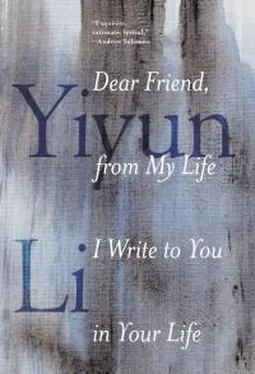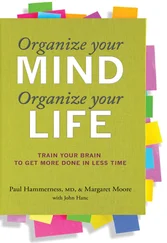There was a young girl in the hospital, a college student, who cruised the hallway warning of an invasion by some strange technology. Her mind was so brilliant and knowledgeable, her words so full of humor and wisdom, her admonishment as musical as the refrain of a Greek chorus, that I often watched her with admiration. During visiting hours her mother was always there, and once she brought a friend who had grown up with the girl. The mother and daughter walked back and forth in the hallway, and the friend, a step behind, wept soundlessly without wiping away her tears.
In his foreword, McPherson admits to keeping a distance from Pancake at a late point in their friendship. He refused to open a package from Pancake for months, until the news of Pancake’s death reached him. It contained a gift, as McPherson had guessed; it also contained a letter, in which Pancake said he was not waiting for a reply—such a statement always means the opposite. The understanding between two people, and the alienation because of it—the friendship between McPherson and Pancake upsets me. It is one person’s melodrama avoiding another person’s melodrama; it is silence that does not prevail.
Someone asked me why I do not worry about feeling exposed while writing. It should be the most natural question for me, yet it has never occurred to me to ask. To be exposed means that a stranger could learn something about me through reading my words and against my wish. Perhaps he could, and he would come to a conclusion, right or wrong, though what would that do but define me in external terms?
The external has a limited claim on understanding and feeling. I can never say that I understand my characters; I certainly have no right to say that I feel their feelings fully. Though if I know them, however limitedly, it is enough for me to want to know them more. What is a more secretive way to struggle than struggling along with people to whom I remain unknown and unseen? My melodrama would not transgress and cause any damage to the characters. In life I do not have that confidence.
Is there, I wonder, an endpoint to knowing—not that one has known everything, but that one knows enough. This ceaseless effort—I have seen this trait in my friend who argues against herself along with the world—protects one from melodrama, as understanding and feelings do not.
—
EVA ALTMANN STAYED in America until 1943, when she reunited with her parents in England and later became a medical doctor. Had she died crossing the Atlantic, she would have become a footnote in the personal history of the Zweigs and the national history of wartime England. The word affiliation shares an etymology with filial. It is a child’s fortune that she is not merely defined by her affiliation with her parents, her heritage, memory and history that deny her an independent future.
Eva was a small part of the Zweigs’ final years, but reading their letters, I could not avoid the futile question: What if it had been arranged for Eva to live with them? In their letters, they often questioned whether it would be better for her to join them in Brazil, but in almost every letter they tried to convince themselves and Eva’s parents that New York was a more suitable place for a young girl. In his last letter to the Altmanns, written the day before the Zweigs’ suicides (postmarked three days later, it was received, like the letter in Zweig’s novella, after its author’s death), Stefan wrote, “Had Lotte’s health been better and had we could have [ sic ] Eva with us it would have had sense to continue…” Would a young life around have offered an anchor? Three months earlier the Zweigs had also considered, out of extreme isolation, adopting a puppy—“Only we fear to get attached if one day we should have to move or leave again.”
A writer’s letters and journals grant her a triumphant position, however illusory, against time’s erosion. They also award a reader the flattering feeling of kinship. When Katherine Mansfield claimed in her journal that she loved Chekhov so much she wanted to adopt a Russian baby and name him Anton, her emotional transparency embarrassed me. I felt the urge to laugh because I was terrified to recognize even a residue of myself in her. It occurred to me much later that she was by then dying of tuberculosis, the same disease that led Chekhov to an early death. Our admiration and scrutiny of another person reflect what we love and hate to see in ourselves.
What do we gain from wanting to know a stranger’s life? But when we read someone’s private words, when we experience her most vulnerable moments with her, and when her words speak more eloquently of our feelings than we are able to, can we still call her a stranger? I have convinced myself that reading letters and journals is a way of having a conversation with those writers, but surely it is as glib as calling perusing the music score of a symphony the same as listening to it. A conversation requires more than scribbling in the margin.
Sometimes I suspect that I am drawn to those who don’t converse with me because I have not outgrown a childish wish that they will teach me how to live. Or, a slightly more complicated version: I wish that they would teach one how to die. But their deaths can only be read in edited versions. Their letters and journals come to an end, artfully and artificially maneuvered by the editors. The last one collected in Hemingway’s letters is to a nine-year-old boy, written three weeks before Hemingway’s suicide, and the boy himself only lived another seven years. Turgenev, on his deathbed, wrote to his estranged friend Tolstoy: “I am really writing you, therefore, to tell you how happy I have been to be your contemporary, and to express to you my final, sincere request. My friend, return to literature!” Mansfield’s last note, from an unfinished story, ends with an observation that only the dying Mansfield would make: “It was an exquisite day. It was one of those days so clear, so still, so silent you almost feel the earth itself has stopped in astonishment at its own beauty.”
All people lie, in their writing as much as in their lives. It frustrates me that I hold on to an unrealistic belief: there is some irrefutable truth in each mind, and the truth is told without concealment or distortion in a letter or in a journal entry. My obligation is to look for that truth; finding it will offer me the certainty I don’t have in me. With that certainty I will find a way to build a solid self. This burden I never take on while reading or writing fiction.
I read the Zweigs’ letters from South America because I wanted to understand how they had descended into the darkest depression. But the story line—if it could be called a story line—of Eva became a counterpoint to that descent. It had moments of laughter, mundanity, even pettiness. The Zweigs’ comments on Eva’s host family were not always kind; her boarding school in upstate New York was looked at with European suspicion; her tardiness in correspondence was blamed on the American influence; there was a fear that her host family would never return her; and again and again there was discussion of arranging for Eva to go to Brazil. As their letters became increasingly melancholy, and as they—especially Stefan Zweig—increasingly refused to believe in any hope for themselves or for mankind, Eva was never included in that despair. This impunity is the same wishful thinking as when parents want to spare their children the difficulties they themselves have had to live through. Yet without that wishfulness, what are the parents doing but letting the melodrama of their own memories dictate the next generation’s fate?
—
ONCE IN A while I get an email from someone I have met briefly. “You may not remember me,” these emails often begin, the hope to be remembered expressed by the acceptance of having already been forgotten.
Читать дальше












